Overview
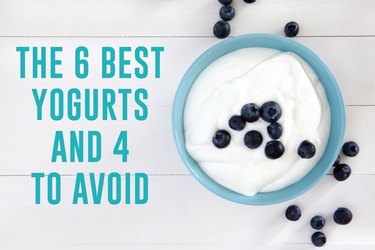
Yogurt in its purest form is inherently simple and healthy. You take milk, add some probiotic bacteria — and voila! Unfortunately, buying yogurt at the supermarket isn't quite so easy. You have to sift through products made from all different kinds of milks (cow, sheep, almond, etc.) in a variety of styles and textures (Greek, Icelandic, Australian, etc.). Some yogurts contain real fruit and real sugar and others don't. Some yogurts are heat-treated, which damages the healthy bugs that our guts love.
Video of the Day
Video of the Day
To save you a little time and a lot of frustration, we sorted through the cluttered supermarket shelves and found the six best and four worst yogurts. All of the best yogurts are lower in sugar, have higher-quality ingredients and have live active cultures.
1. BEST: Siggi's Icelandic Skyr
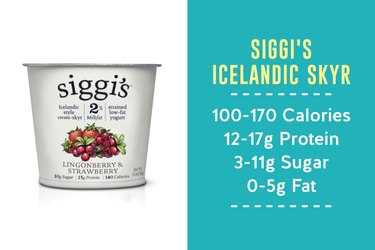
Icelandic-bred Siggi Hilmarsson decided to make his own brand of yogurt when he found that supermarket shelves lacked low-sugar, simple-ingredient options. Skyr — pronounced "skeer" — is a cultured dairy product that's said to have been around for more than 1,000 years in Iceland. It's characteristically low in fat and high in calcium and protein, making it a great, nutrient-rich option. Siggi's offers nonfat, low-fat and full-fat varieties in delicious flavors like Coconut, Orange & Ginger and Mixed Berries & Acai.
2. BEST: Blue Hill Yogurt
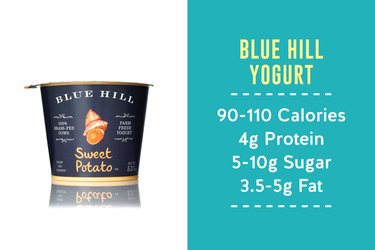
Parsnip. Butternut squash. Beet. We're not talking Thanksgiving dinner here: Instead, we're naming flavors of Blue Hill yogurt. Blue Hill dominates the market when it comes to savory yogurts. Its products are lower in sugar — ranging from five to 10 grams — and made with milk that is sourced from 100 percent grass-fed cows. Because these yogurts defy convention with flavors like tomato and sweet potato, you can take them beyond breakfast by incorporating them into lunch and dinner recipes. Satisfy your appetite by adding carrot yogurt to your carrot-ginger soup or using parsnip yogurt as a dip for parsnip fries.
3. BEST: Forager Project Cashewgurt
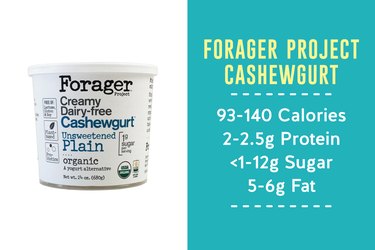
Vegans and people who are lactose-intolerant will fall in love with Forager's Cashewgurt. This dairy-free yogurt doesn't have that "slightly off" artificial taste you might get from other similar products. Right now, Forager offers five delicious flavors: Plain, Wild Blueberry, Lemon, Vanilla Bean and Strawberry. The San Francisco-based company keeps the ingredients to a minimum, avoiding additives like artificial coloring, so you'll find beneficial foods like turmeric adding a beautiful, naturally golden color to your lemon yogurt. The Plain flavor is quite low in sugar, with just two grams per serving. The other flavors are, unfortunately, moderately high in sugar — 12 grams — but still make a great option for those who are have dairy-free or low-dairy diets.
4. BEST: Kite Hill Almond Milk Yogurt
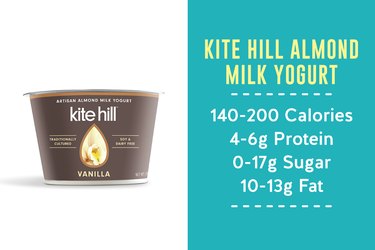
Kite Hill's almond milk yogurt is another delicious option for dairy-free yogurt lovers. You can taste the freshness and authenticity of Kite Hill's ingredients in each of its flavors, which include Blueberry, Peach, Key Lime and Plain. If you're looking for something that's totally stripped down, the Plain Unsweetened version has no added sugar. Kite Hill's yogurts are great for thickening up smoothies or using as a base for sweet-and-savory dips. For options that are lower in sugar, stick to the Plain, Plain Unsweetened, Vanilla and Blueberry flavors.
5. BEST: Wallaby Greek Lowfat Yogurt
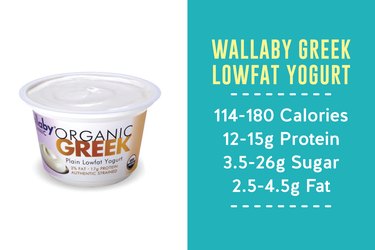
As you may suspect by the name, this yogurt is an Australian-style blended yogurt, making it extra creamy. To make the yogurt's distinct texture and subtle flavor, Wallaby uses organic dairy from pasture-based farms and processes it in small batches. One of its most nutritious products is the Greek Lowfat Yogurt line. The Plain version has 17 grams of protein and 4 grams of sugar per serving. Just be sure to avoid the Honey flavor, which packs 26g of sugar.
6. BEST: Smari Icelandic Yogurt
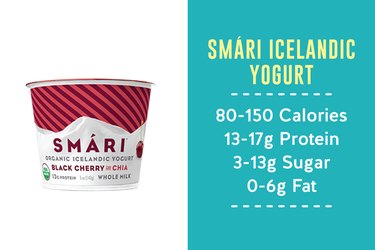
If you're on a fitness grind or simply trying to lose weight, Smári's yogurts are an awesome breakfast staple to add to your diet. Why? They have more protein per serving than any other yogurt on the U.S. market, according to the company's website. Sáari's yogurt is an organic Icelandic skyr made with milk from grass-fed cows. The company uses real, whole ingredients (coconut flakes, strawberries and vanilla beans) to infuse its products with flavor. Plus, it takes about four cups of milk to make one thick-and-creamy cup of Smári yogurt. Because the end result is so concentrated, it's also high in protein — a whopping 13 to 17 grams per serving. And there's a flavor for everyone: Black Cherry and Chia, New Orleans Coffee, Key Lime, Coconut, Pineapple, Pure, Peach, Blueberry and Strawberry.
1. WORST: Fage Greek Yogurt Crossovers (Sweet Flavors)
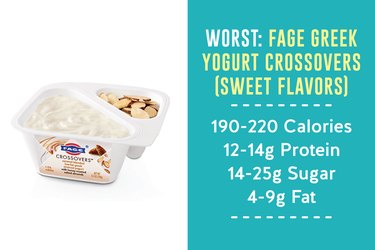
Regular Fage Greek yogurt only has 7 to 8 grams of sugar, but be careful when crossing over to the company's newer Crossovers line. Some of the combos — Olive Thyme With Almonds, Carrot Ginger With Pistachios and Coconut Curry With Cashews — make the grade with about eight to 13 grams of sugar. But others, such as the Honey With Glazed Pecans, Caramel With Almonds and Coconut With Dark Chocolate flavors, make it seem like we're confusing the yogurt section with the ice-cream section. These flavors can have as much as 23 grams of sugar per serving. Our advice? When it comes to Fage's Crossovers, stick with the savory options.
2. WORST: Yo Crunch
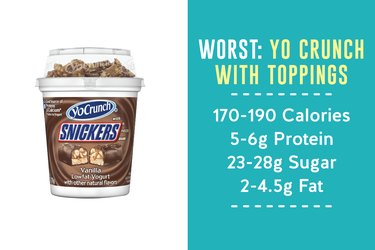
Yo Crunch might not seem that offensive at 180 calories per serving, but when you consider that many of those calories come from 26 grams of sugar (in the Snickers flavor) and trans fats, there is only one thing to do with this yogurt: Avoid it. No one is fooling us into thinking these products are healthy (with flavors like M&Ms, Chips Ahoy, Oreos and Twix), even with the "Low-fat Vanilla Yogurt with other natural flavors" claim on the front of each container. Leave Yo Crunch on the shelves.
Read more: The 7 Best Protein Bars and 3 to Avoid!
3. WORST: Dannon Fruit on the Bottom
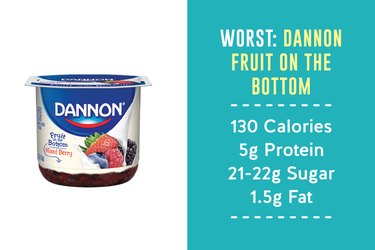
When you make fruit the base of anything it should be healthy, right? Wrong. Overall, Dannon's yogurt isn't the worst of the worst, but you can definitely do better. Its big drawback is that it's pretty high in sugar. We're talking 21 to 22 grams of sugar, when some of our "best" brands have about half that.
4. WORST: Noosa Yogurt
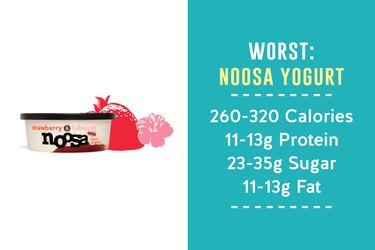
It pains us to place Noosa on the "worst" list because it's so delicious that you'd swear it was a dessert. And with about 30 grams of sugar per 8-ounce container, it pretty much is. Sure, you could eat just half of the container for a snack, but the sugar content would still be on the higher side and, like Pringles, it's hard to stop once you pop. We love the company's use of quality ingredients and creative flavors, such as Bhakti Chai, Pumpkin, Strawberry Rhubarb and Blackberry Serrano. So we recommend reserving these yogurts for the occasional indulgence and keeping an eye on your portion size.
Read more: The 6 Best Granolas and 4 to Avoid
Related Reading
Whether your goal is to trim up your waistline, gain lean muscle or both, Greek yogurt can help you. Chances are, your local grocery store already carries Greek yogurt and may even stock several kinds. Different brands may leave you confused over which Greek yogurt is the best to support your health and fitness.
Protein Content
Susan Bowerman, assistant director of the UCLA Center for Human Nutrition, explains the popularity of Greek yogurt, "It has all the benefits of a high-quality protein without the fat and without the calories." Anyone on a low-calorie, high-protein diet can add Greek yogurt. Barbara Davis, vice president of HealthFocus International, a market research company that studies nutritional trends, states that that the number of people purchasing high-protein foods like Greek yogurt has nearly doubled since 2004.
Healthiest Choice
Vicky Newman, director of the Healthy Eating Program at the Moores' Center for Cancer at the University of California at San Diego, suggests you look very closely at the nutrition labels and pick the Greek yogurt that is low-fat or non-fat. The regular version or "full-fat" version can have up to 20 g of fat with 16 g coming from saturated fat. The "flavored" Greek yogurts are not too healthful either, as these types tend to be high in sugar and calories. Your best bet is the plain, non-fat Greek yogurt. If you want to sweeten it, add fresh fruit.
Comparison to Regular Yogurt
Plain, non-fat or low-fat Greek yogurt is generally more healthful than regular yogurt. Greek yogurt will generally have significantly more protein and significantly less carbohydrates per serving. Many popular regular yogurts have added sugars in the form of high-fructose corn syrup according to Clemson University and the Psychology Department at Princeton University. High-fructose corn syrup encourages your body to store fat significantly more than regular sugar. Both Greek yogurt and regular yogurt contain live bacteria cultures, often referred to as "probiotics," which may promote digestive health and boost your immune system.
Weight Loss With Greek Yogurt
Eating Greek yogurt will not make you directly lose weight or burn fat. Non-fat, plain Greek yogurt, however, is a high-protein and low-calorie food that can be substituted for foods with high calories from saturated fat or simple sugars. Substituting regular yogurt with non-fat Greek yogurt may be a good start. For example, snack on a medium bowl of non-fat Greek yogurt with strawberries and bananas instead of potato chips dipped in a cheese dip to remove a significant amount of calories from your diet. Vicky Newman encourages you to experiment with Greek yogurt beyond as a breakfast food.